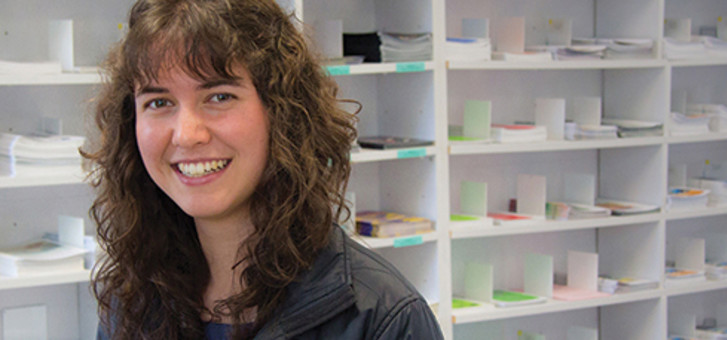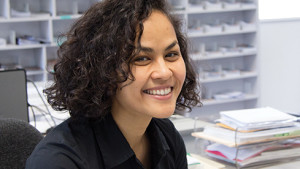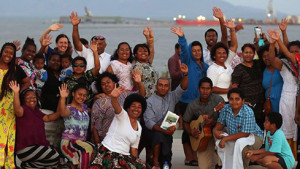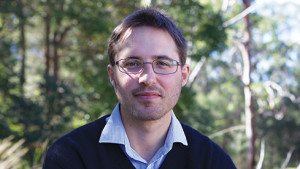Shortly after Charissa’s parents married, her father David drifted away from God. It would be many difficult years before he would finally surrender his life to Jesus. Despite this, he was happy for his wife Gayl to take their two daughters to church.
“I was born into a home where I was taught about God and how much He loved me,” says Charissa. “I will always be grateful for my mother’s godly guidance during those early years.”
Around the age of six, Charissa developed what would soon become her favourite activity. Each Sabbath, when the family returned home from church, Charissa would go to her bedroom, stand in front of the full-length mirror and preach her heart out.
“Few theologians would be able to appreciate the depth of those sermons!” laughs Charissa.
She was missing only one thing—an audience. That all changed when her younger sister Marleta found her preaching to the mirror one day.
“What are you doing?” she asked curiously.
“I’m playing church,” Charissa replied.
“Can I play?” her sister wondered.
“Sure!”
Between the two of them, they came up with an entire church service. Marleta would do the welcome, sing the opening hymn, take up the offering and say the prayer. Charissa would preach, sing the final hymn and then conclude with the benediction. She would then go to the door of their bedroom, shake her sister’s hand and thank her for coming.
But Marleta wasn’t the only one to stumble upon one of Charissa’s sermons. One day, Neale Schofield, the head elder at Waitara Church, was visiting her father David. The door to Charissa’s room was slightly open and Neale could clearly see her passionately preaching to the mirror. That memory would remain with him for many years.

The Fong family.
At the age of 14, Charissa was caught off guard when her English teacher asked her to deliver a speech. The assignment, which she’d completely forgotten about was to read a book and give a speech from a character’s perspective. Charissa had read the book Rachel’s Tears—a powerful book about a student who was shot during the Columbine High School shootings for saying she believed in God.
“Impromptu speeches have never been my thing,” confesses Charissa. “In my early days, I was so scripted that I would even include a symbol in my notes that told me when to breathe!”
As she was presenting this unprepared speech, an idea suddenly popped into her head. Why don’t I make an appeal like evangelists do?
The idea was intriguing. After all, she’d been preaching to a mirror for years. Now she finally had what she’d always dreamed of—a captive audience. When she reached the conclusion of her speech, she said, “And now, if you would like to accept Jesus as your personal Saviour, would you raise your hands with me?”
Nobody moved. In fact, she had never seen her class so still.
Having grown up in the church, Charissa had witnessed many appeals before but people had always responded to those! She was determined not to move until someone else did. She stood there, for what felt like an eternity, until a friend finally took pity on her and raised her hand.
“God bless you, friend,” Charissa said, and she sat down thankfully.
That night, she was in tears, pleading with her mother to let her switch schools. She was too embarrassed to face her classmates again.
It was with great reluctance that Charissa went to school the next day. When her English teacher approached her, she didn’t know what to expect.
“You gave a really good speech yesterday,” her teacher encouraged. “How would you like to give it in assembly?”
Charissa was astounded. “The whole thing? Even with the hands up?”
“Yes,” her teacher confirmed. “I’ve been talking with the teachers and we want the whole thing. You got 99 percent!”
Charissa was thrilled by this news, but also a little inquisitive. “What did I lose the mark on?”
Her teacher laughed. “It was too long.”
Later that day, Charissa presented the speech at assembly as her teacher had requested. Having learned from her previous experience, she modified the appeal to make it more suitable for a general audience. This time, hands went up everywhere!
As Charissa walked off the stage, one teacher grabbed her arm. Tears glittered in her eyes as she said “Thank you.” It was Charissa’s first evangelism appeal—but it was far from being her last.
“My English teacher must’ve seen something in me that could be developed for God’s glory,” says Charissa. “The following year, I was asked to represent the school in a public speaking competition.”
Charissa was secretly terrified and asked if she could pray about it. She finally accepted the opportunity—on one condition. She wanted to speak about God. It would’ve been easy for her teacher to tell her that there was no place for God in a secular competition. But instead her teacher smiled and said, “I think that’s the very best thing you could do.”
The night before the competition, Charissa was a nervous wreck. She remembers kneeling beside her bed, quietly dreading what the next day would bring. “Lord, You and I both know that I can’t do this,” she prayed earnestly. “If You get me through tomorrow . . . no, if You let me win tomorrow, then I promise You that I will speak for You wherever You open the doors.”
The speech was every bit as intimidating as Charissa had feared. At three points, she was distracted, causing her to forget what she had memorised. However she managed to keep her composure, leading the audience to believe that she was pausing for effect.
“Each time, by an absolute miracle, I carried on speaking, with God giving me the words,” Charissa says. “I felt like Jeremiah!”
To her surprise, she qualified for the next round of the contest.
“That was an incredible speech,” the adjudicator told her. “Just one thing. For the next round, take God out of it.”
Her teacher had watched the exchange.
“Do you remember why you went into this?” her teacher asked.
“Yes,” Charissa affirmed.
“Then don’t change a thing.”
Charissa went on to the next round, didn’t change her speech, and didn’t win. She would go on to compete in other public speaking competitions without success. But God had a different calling in mind.
When Charissa was 16, Waitara Church decided to run a teen mission. Neale Schofield remembered how many years ago, he had seen this young girl preaching in front of her bedroom mirror. After much thought and prayer, he and his wife Coralie decided that Charissa should be the speaker for this mission. Charissa had no idea what to expect. She didn’t have any prior experience in running a campaign. She didn’t have a theology degree. And she didn’t have any evangelistic training.
But she agreed anyway, remembering the promise she had made to God—that she would speak for Him wherever He opened doors.
As a result, 32 people made decisions for baptism. Others committed to keep Sabbath.
Since that first campaign, the doors have continued to open for Charissa. She has come a long way away from that bedroom mirror—preaching in Canada, Romania, Indonesia, England, the USA and all around the Pacific.
“I couldn’t do it without God’s leading and the support of my loving family,” Charissa says.
In 2007, her father David was rebaptised into the Adventist Church and is now an enthusiastic Sabbath School teacher and musician at Waitara. Her mother Gayl has maintained her passion for leading people to Christ by becoming a Bible worker. And her sister Marleta, who recently recorded her debut album, still sings special items when Charissa preaches.

L-R: Charissa, David, Gayl and Marieta.
In 2014, Charissa completed a Graduate Diploma in Theology and Ministry at Avondale College. Today, she works in the Discovery Centre at HopeChannel. She doesn’t know what the future holds but is eager to keep evangelising and sharing her faith.
“It doesn’t matter who you are,” she says with confidence, “there are no limits to what God can do through us when we give our all to Him.”






